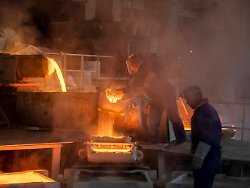Purchasing managers’ index falls
China’s economy sends signal of weakness
1/30/2022 12:02 p.m
China’s current corona policy is reaching its limits: the authorities can do so little against the Omicron variant. The IMF is already calling for a course correction. The government is helping the economy more. Indicators are signaling that growth is in jeopardy.
The Chinese industry felt the effects of the corona restrictions at the beginning of the probably difficult year 2022. January’s Purchasing Managers’ Index signaled a decline but remained just above the 50-point mark, above which growth is indicated. The country’s statistics office put it at 50.1 points, down from 50.3 in December. The analysts’ expectations were thus slightly exceeded. The value is also significantly better than in another survey among purchasing managers of companies. For this purpose, mainly smaller companies in coastal regions were interviewed. This was the sharpest decline in 23 months.
Experts fear a significant economic slowdown this year in the world’s second largest economy, which has so far weathered the Corona crisis much better than many other countries. However, the zero-Covid strategy with very tough but selective lockdowns could no longer work with the much more contagious Omicron variant. The International Monetary Fund (IMF) has therefore asked the leadership in Beijing to change course. The IMF has just cut its growth forecast for China to 4.8 percent. Previously, 5.6 percent was expected for 2022.
In addition to the problems in the real estate market, consumer demand is also subdued. Many companies in the People’s Republic feel this, as well as the higher costs for raw materials. Industrial profits rose more slowly in December than they had in more than a year and a half. The central bank has already reacted to the increased number of corona infections, among other things: interest rates have been lowered and more money pumped into the financial system. Further easing steps are expected in the coming weeks. However, because interest rates are slowly rising again elsewhere, this could result in capital outflows from China.
Zhang Zhiwei, chief economist at asset manager Pinpoint, attributed the weaker manufacturing PMI to sluggish domestic demand. The service sector is also affected – as a result of the lockdowns of entire cities with millions of inhabitants. Further state aid is therefore to be expected.
The purchasing managers’ index for the service sector also signaled growth in January, but less than recently. It fell to 51.1 points – after 52.7 points in December. At 50.1 points, the barometer for industry and service providers together was only a hair’s breadth above the growth threshold. Compared to December, when there were still 52.2 points, there is a clear decrease.
